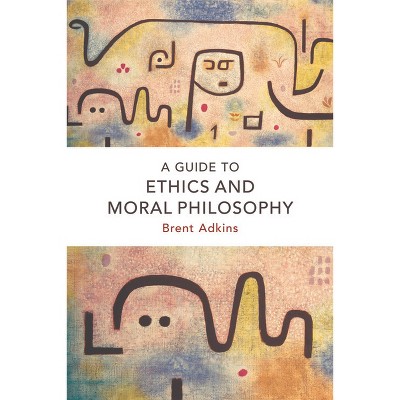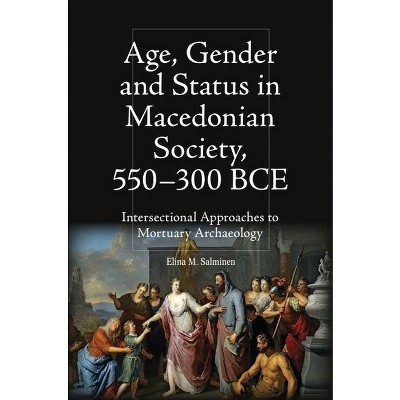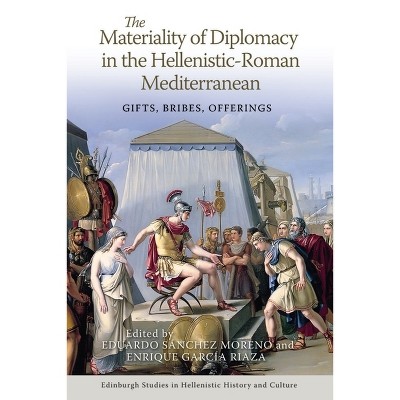Moral History from Herodotus to Diodorus Siculus - by Lisa Irene Hau (Paperback)

About this item
Highlights
- Lisa Irene Hau argues that a driving force among Greek historians was the desire to use the past to teach lessons about the present and for the future.
- About the Author: Lisa Irene Hau is Lecturer in Classics at the University of Glasgow.
- 320 Pages
- History, Ancient
Description
About the Book
Lisa Irene Hau argues that a driving force among Greek historians was the desire to use the past to teach lessons about the present and for the future. She uncovers the moral messages of the ancient Greek writers of history and the techniques they used to bring them across.
Book Synopsis
Lisa Irene Hau argues that a driving force among Greek historians was the desire to use the past to teach lessons about the present and for the future. She uncovers the moral messages of the ancient Greek writers of history and the techniques they used to bring them across.
From the Back Cover
'Hau deploys the overt moralising of the Hellenistic historians to illuminate the more implicit and thought-provoking moralising of their Classical forebears. Among other questions she asks: does moral didacticism make for bad historiography? Was it simply a lens for viewing events, or could it drive wholesale invention?' Emily Baragwanath, The University of North Carolina at Chapel Hill An investigation of moral lessons and moral-didactic techniques in ancient Greek historiography Why did human beings first begin to write history? Lisa Irene Hau argues that a driving force among Greek historians was the desire to use the past to teach lessons about the present and for the future. She uncovers the moral messages of the ancient Greek writers of history and the techniques they used to bring them across. Hau also shows how moral didacticism was an integral part of the writing of history from its inception in the 5th century BC, how it developed over the next 500 years in parallel with the development of historiography as a genre, and how the moral messages on display remained surprisingly stable across this period. For the ancient Greek historiographers, moral didacticism was a way of making sense of the past and making it relevant to the present. But this does not mean that they falsified events: truth and morality were compatible and synergistic ends. Lisa Irene Hau is Lecturer in Classics at the University of Glasgow. Cover image: Continence of Scipio, Pompeo Girolamo Batoni, c.1771-72. The State Hermitage Museum, St. Petersburg. Photograph (c) The State Hermitage Museum/photo by Vladimir Terebenin Cover design: [EUP logo] edinburghuniversitypress.com ISBN 978-1-4744-1107-3 BarcodeReview Quotes
This volume, from which I personally have learned a great deal, is a tremendous achievement and can be recommended to all readers... To conclude, it must be reiterated that the author demonstrates a wonderful grasp of ancient Greek historiography as a whole and an astonishing knowledge of the modern scholarship. This very coherent book would and will form an excellent introduction to ancient Greek historiography for any graduate student, in particular as it offers a complete bibliography for further research.--Edith Foster, University of Queensland "Histos"
Moral History from Herodotus to Diodorus Siculus shows the invigorating power of history for both ethical and political life. Hau's novel, lucid, and cogent arguments should inspire students of ancient political thought to widen their consideration of ancient history even as it invigorates their moral lives towards nobler exempla... Hau's trove of discoveries about the techniques and strategies of these moral historians should hasten even more work on the implications of these lessons for social and political life. Moral History from Herodotus to Diodorus Siculus is certainly invigorating.--Joel Alden Schlosser, Bryn Mawr College "POLIS, The Journal for Ancient Greek Political Thought"
Hau deploys the overt moralising of the Hellenistic historians to illuminate the more implicit and thought-provoking moralising of their Classical forebears. Among other questions she asks: does moral didacticism make for bad historiography? Was it simply a lens for viewing events, or could it drive wholesale invention?-- "Emily Baragwanath, The University of North Carolina"
It has become a commonplace in modern scholarship to view the moral and didactic aims of the ancient Greek historiographers as something entirely separate from, and generally detrimental to, the value of their works as history. In this groundbreaking book, Hau seeks to challenge this pervasive assumption. She argues that it is only by taking the 'moralizing impulse' in ancient historiography seriously as a way to shape the events of the past into the narrative form that is the most useful and relevant to their intended readers that we can reach a full understanding of what the ancient Greek historiographers were actually trying to achieve... As Hau convincingly concludes: (1) moral didacticism and historical explanation are not mutually exclusive, (2) moralizing was not limited to those historians generally perceived as inferior (such as Xenophon or the Hellenistic historians) but was a fundamental component of ancient historiography from its very beginning and (3) the moral basis of ancient historiography does not make it 'bad' history but instead allows it to teach its readers valuable universal truths.--Frances Powell, University of Alberta "Journal of Hellenistic Studies"
The bibliography, the place index, and the general index (p. 278-312) round off the book, which is also designed in a graphically appealing manner. Overall, Hau's comprehensive work provides thought-provoking and interesting suggestions. (Translated from the German)--Carlo Scardino, Heinrich-Heine-Universität Düsseldorf "Bryn Mawr Classical Review"
About the Author
Lisa Irene Hau is Lecturer in Classics at the University of Glasgow. She is the author of Beyond the Battlefields: New Perspectives on Warfare and Society in the Graeco-Roman World (2008). She is a contributor to Defining Greek Narrative edited by Douglas Cairns and Ruth Scodel (EUP, 2014).











